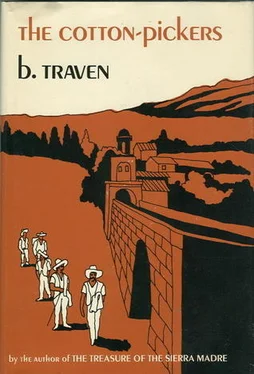B. Traven - The Cotton-Pickers
Здесь есть возможность читать онлайн «B. Traven - The Cotton-Pickers» весь текст электронной книги совершенно бесплатно (целиком полную версию без сокращений). В некоторых случаях можно слушать аудио, скачать через торрент в формате fb2 и присутствует краткое содержание. Год выпуска: 1969, Издательство: Hill and Wang, Жанр: Проза, на английском языке. Описание произведения, (предисловие) а так же отзывы посетителей доступны на портале библиотеки ЛибКат.
- Название:The Cotton-Pickers
- Автор:
- Издательство:Hill and Wang
- Жанр:
- Год:1969
- ISBN:нет данных
- Рейтинг книги:3 / 5. Голосов: 1
-
Избранное:Добавить в избранное
- Отзывы:
-
Ваша оценка:
- 60
- 1
- 2
- 3
- 4
- 5
The Cotton-Pickers: краткое содержание, описание и аннотация
Предлагаем к чтению аннотацию, описание, краткое содержание или предисловие (зависит от того, что написал сам автор книги «The Cotton-Pickers»). Если вы не нашли необходимую информацию о книге — напишите в комментариях, мы постараемся отыскать её.
—Book World
The Cotton-Pickers — читать онлайн бесплатно полную книгу (весь текст) целиком
Ниже представлен текст книги, разбитый по страницам. Система сохранения места последней прочитанной страницы, позволяет с удобством читать онлайн бесплатно книгу «The Cotton-Pickers», без необходимости каждый раз заново искать на чём Вы остановились. Поставьте закладку, и сможете в любой момент перейти на страницу, на которой закончили чтение.
Интервал:
Закладка:
Half an hour later he had paid up every peso that was demanded.
“You may reopen your café at seven this evening,” said the Secretary. “I’ll see to it that the revocation order is in your hands by that time.”
Doux folded the receipts, each one duly affixed with the legal stamps. “Señor Secretary, there’s one small point I’d like to make.”
“Well?”
“Must I really pay the wages for the whole week on Fridays?”
“You had better, Señor Doux.”
“What happens then if a man is paid on Friday and doesn’t show up on Saturday? He’d have rooked me out of a whole day’s pay.”
“My, my,” said the Secretary, smiling, “but you’re good at figures. I’d never have expected it of you. You’ve held back the men’s wages for as much as six weeks, not one day, remember, but six weeks.”
“But the men always got their wages in the long run. They knew they were safe, anyhow,” and Doux puffed out his chest.
“Whether you’re as solid as all that is still very much open to question. You could sell out secretly and make off with the wages due; some employers have done that. But that probably wouldn’t happen in your case. What has happened is that you’ve always held onto the wages for a few weeks and made use of money that belonged to the waiters without paying them any interest. Why should the workers be expected to lend you their wages free of charge? This must stop. You can count yourself very lucky that we haven’t required the whole week’s wages to be paid on Wednesdays, so that the risk would be equally divided. We’ll leave it at Friday. If you treat the men decently, none of them will run off with that one day’s pay. But if a worker should do it once in a while it won’t ruin you. Well, that answers your question. You’d better run along now, so that you can be ready for your customers at seven o’clock.”
Doux left the office and made his way home.
14
“That’s quite sensible, what you’ve done,” said Señora Doux, to Doux’s complete surprise. “But if things had been done my way in the first place, we could have saved ourselves all this trouble.”
“Your way?” asked Señor Doux. “Everything was always done your way. It was you who were always telling me to fire the waiters, that waiters were two for a penny, anyway.”
“Well, that was true, wasn’t it? They were falling over themselves to get work, then. I never thought there’d come a day when all we could get would be two tramps. That was where my calculations went wrong. Don’t worry, we’ll soon recover the money. The bakery and pastry shop will have to make up for it. They’re a better lot of workers than the waiters; at least they’re not bolshies.”
So there it was. We in the bakery and pastry shop had to make good the loss. Now Doux invested in publicity. Ads in newspapers and movie houses declared the excellence of his bread, his cakes, and his pastries.
The result of this was that we now had to start work at ten every night, Saturdays at nine, and work through until four, sometimes five o’clock the next afternoon. That became a new rule. If anyone didn’t like it, he left; and Doux would then declare that no one had applied for the job, and that the rest of us would have to take over the man’s work for the time being. Sometimes it happened that two men quit on the same day, and then there was the work of two men to make up for.
Doux would put off replacing the missing workers as long as possible so as to save the wages. We knew this because we sent men to him and he told them there was no vacancy. This went on until we simply left orders unfilled. When it was a case of an order for a birthday cake or some other food for a special occasion, it went badly for Señora Doux. Of course the Señor would make himself scarce and she would have to fight it out with the customer. At last this got to be too much for her, so she herself would hire one or two new men, always the cheapest she could get, men who knew nothing about the trade and hadn’t the intelligence to pick it up quickly.
The master baker had daily arguments with Doux over supplies. One day the sugar supply was very low. The master went to Doux and told him that we needed two hundred kilos of sugar.
“All right, all right,” said Doux, “I’ll order some right away.”
But he put off ordering it, just to keep the money in his pocket a few days longer. The moment came when we had no sugar at all, and we were having rows with the waiters who came into the bakehouse to take the last scrapings from the barrel for the café, where every sugar bowl was empty. Then Doux rushed off in a frenzy to get the sugar in as quickly as he could, while we in the bakehouse had to stand about and wait, as we couldn’t bake without sugar; worse, we couldn’t clean up and go to bed, for the baked goods had to be finished.
It was the same with the eggs. Five hundred cases were ordered one week, and they were delivered. Then, when we were working on the last fifty cases, the master told Doux that it was time to order more eggs.
“Can’t it wait until tomorrow?” asked Doux.
“Yes, it can wait until tomorrow, but not a moment longer.”
“That’s all right, then,” said Doux, mightily pleased that he could put it off for one day.
Next morning the master had to run to him again. “It’s getting urgent. By day after tomorrow we’ll be all out of eggs.”
This time Doux didn’t ask if it could wait until the next day; but he put it off, on his own responsibility. And so the moment came when we were all standing about, just waiting for eggs.
And it was the same story with the ice. The ice cream had to be ready by two o’clock. We might have the mixture ready in good time, but the ice wouldn’t be on hand because Doux had ordered it too late. It would arrive at three or four, when it should have arrived at one o’clock, and so we would have to stand around two or three hours, unable to knock off work until the ice cream was ready for the café.
That was how we wasted our time, not working time, but our own free time, just because Doux wanted to hang on to his money for a few more hours; and because our time was bought by him not by the hour but by the day. Each minute of our lives belonged to him; he bought it and paid for it, by way of our meager wages.
If we didn’t like it, well, it was true that we could leave. We could go and starve, for jobs were few and far between; and any available work was snapped up by local men who did it for a wage on which it was impossible to live — even if you did see them and their families living on it.
There wasn’t any choice. You either had to starve or do as the boss wanted. He couldn’t do as he liked with the waiters anymore, so we had to cope with everything that he couldn’t push onto them. We were the rabble. If we quit, there were twenty more waiting outside only too pleased to get into a bakery where there was not only plenty of bread and cake to eat, but where there were even regular meals, the like of which these hungry men had never seen on their own tables.
The waiters were intelligent fellows, Mexicans and Span-. lards, alert and active. But we in the bakery were gathered in from the road and the bush, without family or fixed abode. Some couldn’t even speak Spanish. Our working conditions and wages didn’t offer the slightest inducement to workers with any pride. We had a certain individualistic common pride, but you can’t reform the living conditions of the worker with that; for the employer has pride enough of that kind himself and he knows how to use it to his own advantage. That battlefield is his; he knows every trick and can parry every thrust with success. We itinerant workers were simply attempting to save a little money and start a small business, or scrape together the fare for a try somewhere else — Colombia or wherever. We were trying to get as much from the furrow we were plowing as we possibly could. Whether those who came after us fell by the wayside was a matter of indifference to us. Everyone is his own best friend. If the grass gets scarce while I’m grazing I’ll pull up the roots as well.
Читать дальшеИнтервал:
Закладка:
Похожие книги на «The Cotton-Pickers»
Представляем Вашему вниманию похожие книги на «The Cotton-Pickers» списком для выбора. Мы отобрали схожую по названию и смыслу литературу в надежде предоставить читателям больше вариантов отыскать новые, интересные, ещё непрочитанные произведения.
Обсуждение, отзывы о книге «The Cotton-Pickers» и просто собственные мнения читателей. Оставьте ваши комментарии, напишите, что Вы думаете о произведении, его смысле или главных героях. Укажите что конкретно понравилось, а что нет, и почему Вы так считаете.











